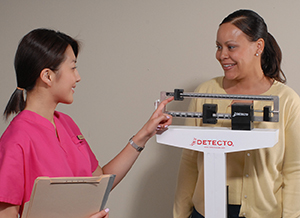Being a healthy weight is important for both you and your baby. The weight you gain now is not just extra fat. It is also the weight of your baby. And it is the increased blood and fluids to support the baby. A slow, steady rate of gain is best. How much you should gain depends on your weight before getting pregnant. Check with your healthcare provider to find out what is right for you.
Talk to your healthcare provider if you have any questions.
If you gain too much
Gaining too much weight might cause you to feel tired, or you could have a harder pregnancy or birth. If you and your healthcare provider decide you’re gaining too much:
-
Eat fewer fats and sugars. Instead, eat fruit, vegetables, and whole-grain foods.
-
Drink plenty of water between meals.
-
Get at least
20 minutes of light exercise, like walking, each day. -
Don’t diet. You might not get enough of the nutrients you and your baby need.
-
Keep a food diary to help you gauge what and how much you are eating.
If you're not gaining enough
If you don’t gain enough, your baby could be too small or have health problems. Women tend to gain most of their weight in the second and third trimesters. For now:
-
Eat many types of foods. Make sure you get enough calcium, protein, and carbohydrates.
-
Don’t skip meals.
-
Eat healthy snacks.
-
Pick nutrient-dense, high-calorie healthy food like trail mix or protein shakes.
-
See a dietitian for help.
-
Talk to your healthcare provider if you have had an eating disorder or problems with certain foods.
The following are ways to get more calories:
-
Eat breakfast every day. Peanut butter or a slice of cheese on toast can give you an extra protein boost.
-
Snack between meals. Yogurt and dried fruits can provide protein, calcium, and minerals.
-
Try to eat more foods that are high in good fats, like nuts, fatty fish, avocados, and olive oil.
-
Drink juices made from real fruit that are high in vitamin C or beta-carotene, like grapefruit juice, orange juice, papaya nectar, apricot nectar, and carrot juice.
-
Don't eat junk food, like foods high in sugar.


